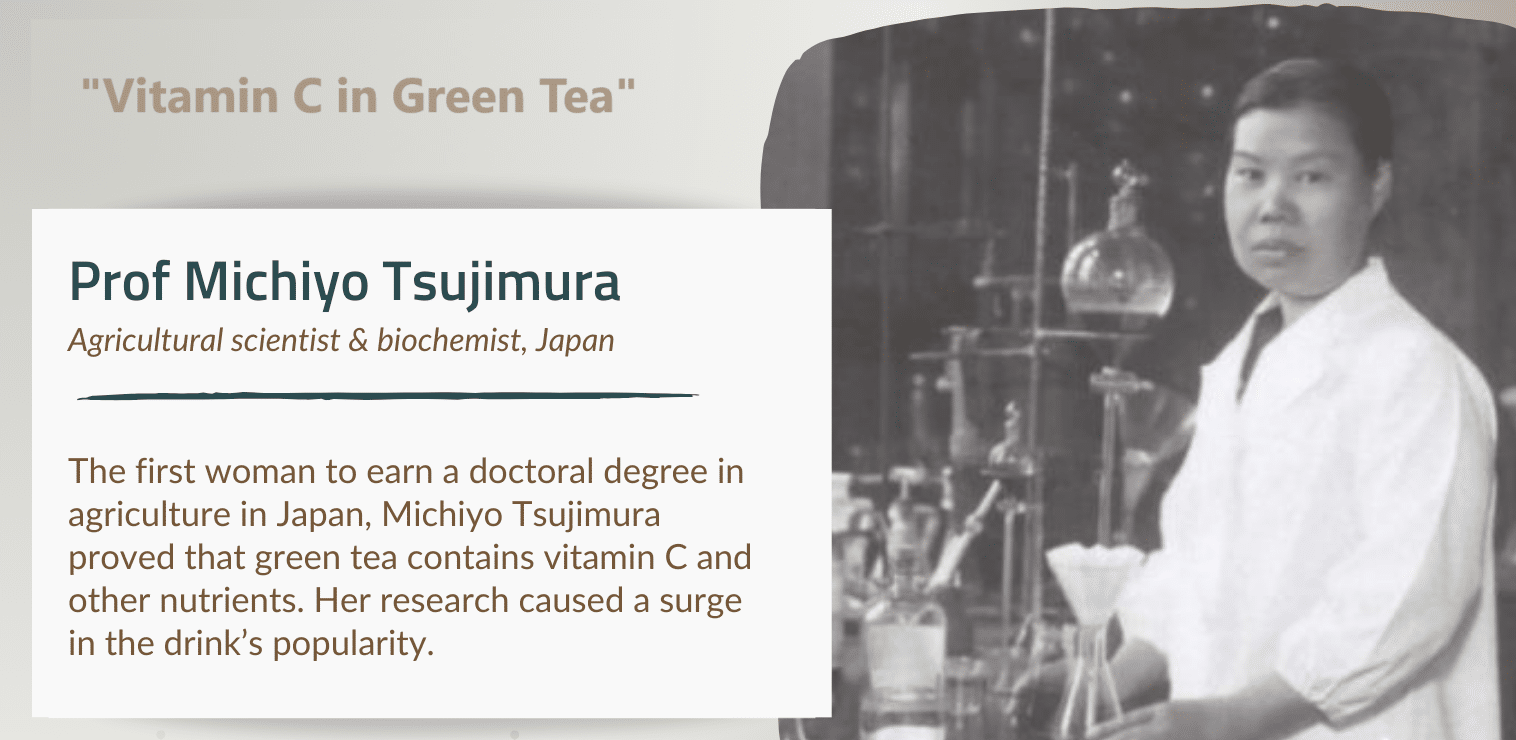Learning
The Pioneering Work of Michiyo Tsujimura in Green Tea Research

Michiyo Tsujimura, a notable Japanese agronomist and biochemist, made groundbreaking contributions to the study of green tea. She was the first woman in Japan to earn a doctoral degree in agriculture. Tsujimura’s research and career achievements have left a lasting impact on the understanding of green tea’s components and its significance.
The Life of Michiyo Tsujimura
Early Years and Education
Michiyo Tsujimura, a pioneering figure in the world of Japanese green tea, was born in Shizuoka, Japan in 1908. She developed a deep love and understanding of nature from an early age, which greatly influenced her future career. Tsujimura’s educational journey began with a degree in agricultural chemistry from the Tokyo Women’s Higher Normal School in 1929, enabling her to lay the foundation for her groundbreaking work in green tea production.
Breaking Barriers in Science
Tsujimura’s entry into the male-dominated world of science marked a significant breakthrough. She became the first woman to work in the Shizuoka Tea Experiment Station, where she dedicated herself to revolutionizing the cultivation and processing of green tea. Her unparalleled commitment to her craft and her relentless pursuit of excellence allowed her to overcome societal barriers and gain recognition for her expertise in agricultural science.
Key Achievements and Recognitions
Tsujimura’s contributions to the world of tea production were revolutionary. She was instrumental in developing new cultivars of tea plants, leading to improved flavors and yields. Her expertise and innovative techniques earned her esteemed recognition, including the Minister of Agriculture, Forestry, and Fisheries Award in 1979. Tsujimura’s lifelong dedication to advancing the science of green tea solidified her legacy as an icon in the industry.
For more information on Michiyo Tsujimura’s life and contributions, visit The World of Japanese Green Tea.
The Discovery of Vitamin C in Green Tea
Michiyo Tsujimura, a renowned Japanese agricultural scientist and biochemist, made a groundbreaking discovery while conducting her research on green tea components. Her pioneering work, conducted in collaboration with Seitaro Miura, led to the identification of vitamin C in green tea, marking a significant milestone in the field of nutrition science.
The Journey to the Breakthrough
Tsujimura’s journey towards the discovery of vitamin C in green tea was marked by relentless dedication and meticulous experimentation. As a student at the RIKEN research institute, she delved into the intricate composition of green tea, driven by a passion to unravel its nutritional properties. Through rigorous analysis and innovative approaches, Tsujimura persistently pursued the goal of uncovering the elusive presence of vitamin C in this traditional beverage.
How Vitamin C Was Isolated
Through an intensive process of isolation and purification, Tsujimura and her colleague, Seitaro Miura, successfully extracted and identified vitamin C in green tea. Their methodical approach involved the precise separation of the compound from the complex matrix of tea constituents, leading to the definitive isolation of vitamin C.
This significant achievement not only expanded the understanding of green tea’s nutritional profile but also highlighted the meticulous expertise of Tsujimura and Miura in the realm of biochemistry.
The Impact on Health and Nutrition
The revelation of vitamin C in green tea had profound implications for health and nutrition. Tsujimura’s discovery shed light on the multitude of health benefits associated with green tea consumption, emphasizing its role as a potent source of essential nutrients, including vitamin C. This breakthrough significantly contributed to the growing recognition of green tea as a valuable dietary component, fostering a heightened appreciation for its enriching properties and promoting its widespread consumption for health and well-being.
For more information on the impact of vitamin C on health and nutrition, refer to this comprehensive resource.
The Benefits of Green Tea
Antioxidant Properties
Green tea is rich in polyphenols, a type of antioxidant that helps protect the body’s cells from damage caused by free radicals. The main polyphenol in green tea is epigallocatechin gallate (EGCG), which has been shown to have potent antioxidant effects.
These antioxidants help to reduce inflammation and may lower the risk of chronic diseases such as heart disease and cancer. Research indicates that the antioxidant properties of green tea play a significant role in its health benefits.
The Role of Green Tea in Preventing Disease
Studies have shown that green tea may have numerous health benefits, including reducing the risk of cardiovascular diseases. A large study in Japan found that daily consumption of green tea was linked to a lower risk of death from cardiovascular diseases. The antioxidants in green tea, particularly polyphenols, are believed to contribute to this protective effect. Green tea has also been shown to help regulate blood sugar levels, making it beneficial for individuals with diabetes.
Green Tea in Modern Health Trends
In modern health trends, green tea has gained popularity due to its potential to improve mental alertness, aid in weight loss, and alleviate digestive symptoms. It has also been embraced for its potential to regulate blood sugar levels, making it a valuable addition to the diets of individuals with diabetes. Green tea is available in various forms, such as bagged tea, loose leaf tea, and green tea powder, catering to diverse consumer preferences. With its growing presence in the wellness industry, green tea continues to be a key player in promoting overall health and well-being.
For more information on the health benefits of green tea, visit WebMD and Heart Health.
Michiyo Tsujimura’s Legacy
Influence on Female Scientists
Michiyo Tsujimura’s groundbreaking work in agricultural science and biochemistry paved the way for future generations of female scientists in Japan. Her accomplishments as the first Japanese woman to earn a doctoral degree in agriculture served as a role model for women pursuing careers in the sciences. Tsujimura’s dedication and achievements contributed to the recognition of women’s capabilities in the traditionally male-dominated fields of agriculture and biochemistry.
Commemorations and Tributes
To honor Michiyo Tsujimura’s enduring legacy, several commemorations and tributes have been established in Japan. These include educational initiatives, research grants, and awards aimed at encouraging and supporting women in scientific fields. Furthermore, Tsujimura’s contributions to the study of green tea have been celebrated through exhibits in agricultural museums and academic conferences, ensuring that her pioneering work continues to inspire future generations.
The Continuing Research on Green Tea
Michiyo Tsujimura’s research on the components of green tea laid the foundation for ongoing studies in the field of agricultural science and biochemistry. Her discoveries have spurred continued exploration into the health benefits and chemical composition of green tea, leading to advancements in the understanding of its properties and applications. Today, researchers are building upon Michiyo Tsujimura’s work, uncovering new insights that contribute to the broader knowledge of green tea’s significance in both scientific and cultural contexts.
The Science of Green Tea
Green tea has been studied for its potential health benefits, with a focus on the key compounds found in this beverage. The primary compound of interest is catechin, particularly (-)-epigallocatechin-3-gallate (EGCG), known for its antioxidant properties. Studies have shown that green tea catechins may have various beneficial effects, including anti-inflammatory, antiarthritic, antibacterial, and neuroprotective properties. The brewing process is crucial in extracting these compounds from the tea leaves.
Understanding the brewing process can optimize the extraction of beneficial compounds while minimizing the potential health concerns associated with excessive consumption. While the scientific community continues to explore the potential health benefits of green tea, there is ongoing debate regarding its effectiveness in preventing various ailments, such as cancer, cardiovascular diseases, and metabolic syndrome. Further research is essential to validate the pharmacological and clinical effects of green tea and to elucidate its mechanisms of action.
Key Compounds Found in Green Tea
Green tea contains polyphenols, particularly flavanols and flavonols, which contribute to its health-promoting effects. The most abundant catechin in green tea, EGCG, has been associated with many of the observed beneficial effects. Catechins, together with other antioxidant constituents, contribute to the stability and overall antioxidant properties of green tea extracts.
Understanding the Brewing Process
Brewing green tea involves extracting the bioactive compounds from the tea leaves. The brewing temperature and duration can impact the extraction of beneficial compounds, such as catechins and other polyphenols. Optimizing the brewing process is essential for retaining the potential health benefits of green tea.
The Debate on Green Tea’s Effectiveness
While various studies have suggested potential health benefits of green tea, the scientific community continues to debate its effectiveness in preventing specific ailments. The ongoing research aims to provide comprehensive evidence supporting the use of green tea as a preventive measure for conditions such as cancer, cardiovascular diseases, and metabolic syndrome. Further studies following international standards are necessary to validate the efficacy of green tea in promoting overall health and well-being.
Conclusion
Michiyo Tsujimura was a pioneering Japanese agricultural scientist and biochemist who made significant contributions to the study of green tea. Her dedication to research and her groundbreaking accomplishments have left a lasting impact on the field of agricultural science.
Through her work, she paved the way for future generations of scientists, particularly women, to pursue advanced studies and make important discoveries in the field of biochemistry and agriculture. Michiyo Tsujimura’s legacy continues to inspire and influence the scientific community, particularly in the study of green tea and its components.
Keywords:heard of michiyo tsujimura google, biochemist whose research focused, michiyo tsujimura google is celebrating
Post Disclaimer
The above article is sponsored content any opinions expressed in this article are those of the author and not necessarily reflect the views of VORNews. For more information on our sponsored content policy click here.
Learning
Importance of Fast Plumbing Services: Delivering in Just 30 Minutes

The plumbing services industry is about to grow by 2% annually by 2031. With the advancement of technologies, the introduction of smart homes and bathrooms is all set to boost the demand for smart plumbing fixtures shortly. Hence, this makes the plumber’s career more stable, envisaging constant learning and providing hands-on experience in using new technologies.
Plumbing issues are a part of every building; they are unpredictable and may lead to water and property damage. Hence, instead of performing DIY repairs, hiring expert plumbers in Noida will always work. However, finding reliable and affordable plumbers is challenging; therefore, many homeowners hire inexperienced ones. It may temporarily resolve the issues but won’t work for the longer term.
Therefore, always hire experts with years of experience in the same field who can provide quality services even in an emergency. Below, know the importance of fast plumbing services in Noida.
Benefits of Fast Plumbing Services
Since ancient times, plumbing has held immense importance. It assesses the water that comes in and goes out of any building properly. Plumbing services are mainly associated with water-related home repair services and must be tackled promptly and quickly. Hiring plumbers in Noida is beneficial as they ensure they visit your doorstep within 30 minutes of your booking and deliver quality results. The following are the benefits of hiring fast plumbing services:
Availability
Maximum plumbing issues must be tackled quickly before they turn into disasters. The professionals offering fast plumbing services are available anytime to provide quality work. Hence, you needn’t wait hours or days to repair a burst pipe.
Flexibility
Irrespective of time, these plumbers in Noida are ready to help within 30 minutes at your address. These experts work around the clock and employ modern tools and equipment to handle all the issues quickly. Even if you work in the graveyard shift, you can schedule and hire them at your convenience.
Real-Time Solution
Emergent plumber services in Noida provide fast plumbing solutions before the situation worsens; otherwise, the repair will cost you more. In the hustle and bustle of life, the homeowners don’t want to wait for long and rely on word-of-mouth or flipping the telephonic directories. With technological advancements, everyone can easily hire plumbing experts with just a few clicks.
Promptness
Many plumbing service industries have years of experience. Hence, they know that many plumbing issues demand immediate attention, which helps prevent severe damage. These service providers let you connect with experts who match your home needs and visit your doorstep within 30 minutes.
Emergency Training
The professionals regularly undergo varied training and keep themself learning about the latest trains and technologies to use in emergency cases.
Know the Emergency Plumbing Cases
Homeowners can’t differentiate between the emergency and the common issues. The following are the emergency plumbing cases you must consider and resolve as soon as possible:
Overflowing Toilet
An overflowing toilet is considered an emergency plumbing case only if it doesn’t stop until you push the flush; in case it doesn’t work, hiring fast plumbing services in Noida is the best way to resolve the issue, as these plumbers use a drain snake or hydro-jet to fix the problems.
No Water Pressure
If there’s no water pressure, it indicates a leak in your home. It also signifies that your pipe has burst, wasting water that should be resolved immediately to prevent serious issues.
No Hot Water
Hot water is essential for washing dishes and taking showers, but if the heater is not working, there is a chance that the water line is leaking or the heat exchanger has failed. Thus, it’s not an issue that one can wait before it can addressed.
Multiple Clogged Drained
A blocked drain is a nightmare for many homeowners. Maybe there’s an issue with the sewer line. In this case, you must immediately search for the best plumbing services to tackle the problems.
Final Words
Instant plumbing services are pivotal in integrating, maintaining, and functionalizing the home plumbing system. The demand for fast plumbing services is increasing with the increasing demand for smart home fixtures and technological advancements.
Hence, hiring plumbers in Noida is the best decision, as they can visit your address within 30 minutes of booking to provide you with quality solutions. Also, they offer varied benefits such as on-time availability, flexibility, real-time solutions, and promptness. Therefore, safeguard your home from unforeseen plumbing emergencies at the most economical price.
People Also Reading:
Eid ul-Adha 2024: Celebrating Faith, Sacrifice, and Unity in the Muslim World
Unlocking the Mystery of 5201314: Exploring the Symbolism of Love and Eternity
Post Disclaimer
The above article is sponsored content any opinions expressed in this article are those of the author and not necessarily reflect the views of VORNews. For more information on our sponsored content policy click here.
Learning
Lusha Lead Generation Script: Crafting Effective Sales Conversations

In the realm of sales, having a well-crafted script can make all the difference between a missed opportunity and a closed deal. A lead generation script serves as your roadmap to engaging prospects, addressing their needs, and ultimately converting them into loyal customers. Here’s how you can leverage a lusha b2b contacts database lead generation script to elevate your sales game and boost your revenue.
1. Choose Sales Script Type
Select from a Variety of Sales Script Templates
Choosing the right sales script template sets the foundation for successful conversations. Whether you’re engaging with potential clients over the phone, through email, or in person, our diverse range of templates ensures you have the perfect framework to fit your sales approach.
2. Fill Out the Template
Utilize Prep Questions to Craft Compelling Scripts
Effective sales scripts are more than just words – they are structured to resonate with your audience. Our templates include preparatory questions that prompt you to think critically about your customer’s pain points, desires, and objections. This ensures your script is not only persuasive but also highly relevant to your prospect’s needs.
3. Generate Your Script
Access a Complete Script with the Click of a Button
Once you’ve filled out the template, simply click “generate” to receive a comprehensive sales script tailored to your specifications. This automated process streamlines script creation, saving you valuable time while ensuring consistency and clarity in your messaging.
Crafting an Effective Sales Script
Building a personalized sales script has never been easier. Follow these steps to create a script that resonates with your prospects:
- Structure Based on Best Practices: We adhere to proven sales methodologies to structure scripts that effectively communicate value and address objections.
- Prep Questions for Insightful Answers: Start with preparatory questions designed to elicit accurate responses that directly address customer concerns.
- Organize Your Thoughts: Use our guided answers to organize your ideas cohesively, ensuring your script flows naturally and persuasively.
Benefits of Using Our Sales Script Generator
Enhance Your Sales Effectiveness with lusha Free Tool
Our sales script generator empowers salespeople worldwide with tools to build stronger pitches and drive better results. Here’s why you should start using it today:
- Improve Lead Qualification: Streamline the process of identifying and qualifying leads through structured conversations.
- Control the Conversation: Guide discussions towards desired outcomes by addressing prospect objections and highlighting value propositions effectively.
- Prepare for Objections: Anticipate and handle objections with confidence using prepared responses tailored to common scenarios.
- Maintain Consistency: Ensure every interaction aligns with your brand message and sales goals, promoting a cohesive customer experience.
- Confidence to Start Calls: Equip yourself and your team with well-prepared scripts that instill confidence and professionalism from the first call.
Yes! lusha lead generation script builder is completely free and designed to support sales professionals in crafting impactful conversations that drive conversions. Download or save your pitch script today to start closing more deals and achieving your sales objectives.
In conclusion, mastering the art of lead generation starts with a well-crafted sales script. Leverage lusha sales script generator to create personalized, persuasive scripts that engage prospects, address their concerns, and ultimately propel your business towards success. Start scripting your success story today!
People Also Reading:
Unlocking the Mystery of 5201314: Exploring the Symbolism of Love and Eternity
What is Pi123 ? Exploring its Features and Benefits
Post Disclaimer
The above article is sponsored content any opinions expressed in this article are those of the author and not necessarily reflect the views of VORNews. For more information on our sponsored content policy click here.
Learning
What is Pi123 ? Exploring its Features and Benefits

One constant sticks out in the fascinating realm of mathematics, where numbers dance through equations and reveal the mysteries of the cosmos: pi. Pi123, defined as the circumference divided by the diameter of a circle, is a mathematical constant that fascinates scientists and mathematicians alike.
This irrational number, roughly equivalent to 3.14159, is important in many mathematical calculations and may also be seen in natural patterns. In this blog, we also comprehend what Pi123 is and its importance.
The Core of Pi123
Pi is more than simply a number; it’s a phenomenon and an enigma that exists beyond reason. Although it can be precisely determined using various mathematical methods, Pi is an irrational number. This intriguing quality is the foundation for Pi123, an online application created to precisely and easily untangle Pi’s endless digits.
Presenting Pi123
Pi123 is an online calculator that can compute pi to decimal places. It’s much more than just a calculator, however. Pi123 is your go-to partner whether you’re a teacher mentoring the future generation of mathematicians or a student exploring the subject’s complexities. A peek into what sets Pi123 apart in the digital space of mathematical research is this:
- Fast Calculations: Pi123 guarantees quick calculations, making it simple for users to get exact values of pi.
- Interface That’s Easy to Use: Pi123 is easy to use and may be accessed by mathematicians of all skill levels.
- Store and Share: To help with learning and teamwork, the tool has a handy function that allows you to store and share your computations.
- Long History: Pi123 maintains a thorough record of all the calculations you have made in the past, giving you a mathematical journey.
The Significance of Pi123
Pi123 is a doorway to mathematical discovery, not merely a tool. Pi may be calculated to any decimal point, which leads to fresh discoveries and insights. Whether delving into the depths of geometry or solving the riddles of calculus, Pi123 is a beneficial tool for all your mathematical pursuits.
Connecting the Dots: How to Sign Up for the Ekart Partner Center
Identifying more opportunities for development and cooperation is critical as we explore the realm of mathematics. The Ekart Partner Center is one such possibility. See this comprehensive guide for information on how to join this center and join a thriving business endeavor.
Final Thoughts
Pi123 shines as a light in mathematics, showing the way to accuracy and discovery. With unmatched simplicity, Pi123 allows you to study the infinite decimals of pi as a student, teacher, or passionate math lover. Accept the beauty of numbers and use Pi123 as your guide to explore the vast world of mathematical mysteries.
Common Questions Regarding Pi123
What is the purpose of pi?
Pi has been used in a wide range of mathematical and scientific fields. It is mostly used in geometry to indicate the circumference’s ratio to a circle’s diameter. Pi also appears in many mathematical formulae from many mathematics, physics, and engineering fields.
2. To put it simply, what is pi?
Simply put, pi is the number that expresses the relationship between the diameter and circumference of a circle. This number, which is irrational and roughly equivalent to 3.14159, has an infinite decimal form that never ends.
3. Is the value of pi real?
Pi is a real number, yes. It is also an irrational number, precisely, and a mathematical constant. When it is irrational, its decimal form is non-terminating and non-repeating. Despite this, pi is a very real and significant mathematical notion.
4. What’s the ratio of pi?
The connection between a circle’s diameter and circumference is known as the pi ratio. The Greek letter π (pi) represents it mathematically, and its approximate value is 3.14159. The pi ratio is one basic constant often employed in geometry and other mathematical computations involving circles.
More Related:
Elon Musk Confirms 12th Child with Neuralink Executive Shivon Zilis
Post Disclaimer
The above article is sponsored content any opinions expressed in this article are those of the author and not necessarily reflect the views of VORNews. For more information on our sponsored content policy click here.
-
World2 weeks ago
Former President Trump Survives Being Shot at Pennsylvania Rally
-
Tech4 weeks ago
Huawei Launches 5G-A Pioneers Program at MWC Shanghai 2024: Paving the Way for a Connected Future
-
Sports4 weeks ago
NBA Draft: Kyle Filipowski Withdraws Unexpectedly From The First Round
-
Tech4 weeks ago
ChatGPT Answers Undiscovered Questions and Outperforms Students.
-
News4 weeks ago
US Supreme Court Rejects Drug Deal that Protects the Sackler Family
-
Health4 weeks ago
US Health Agency Issues Dengue Virus Infection Warning





















